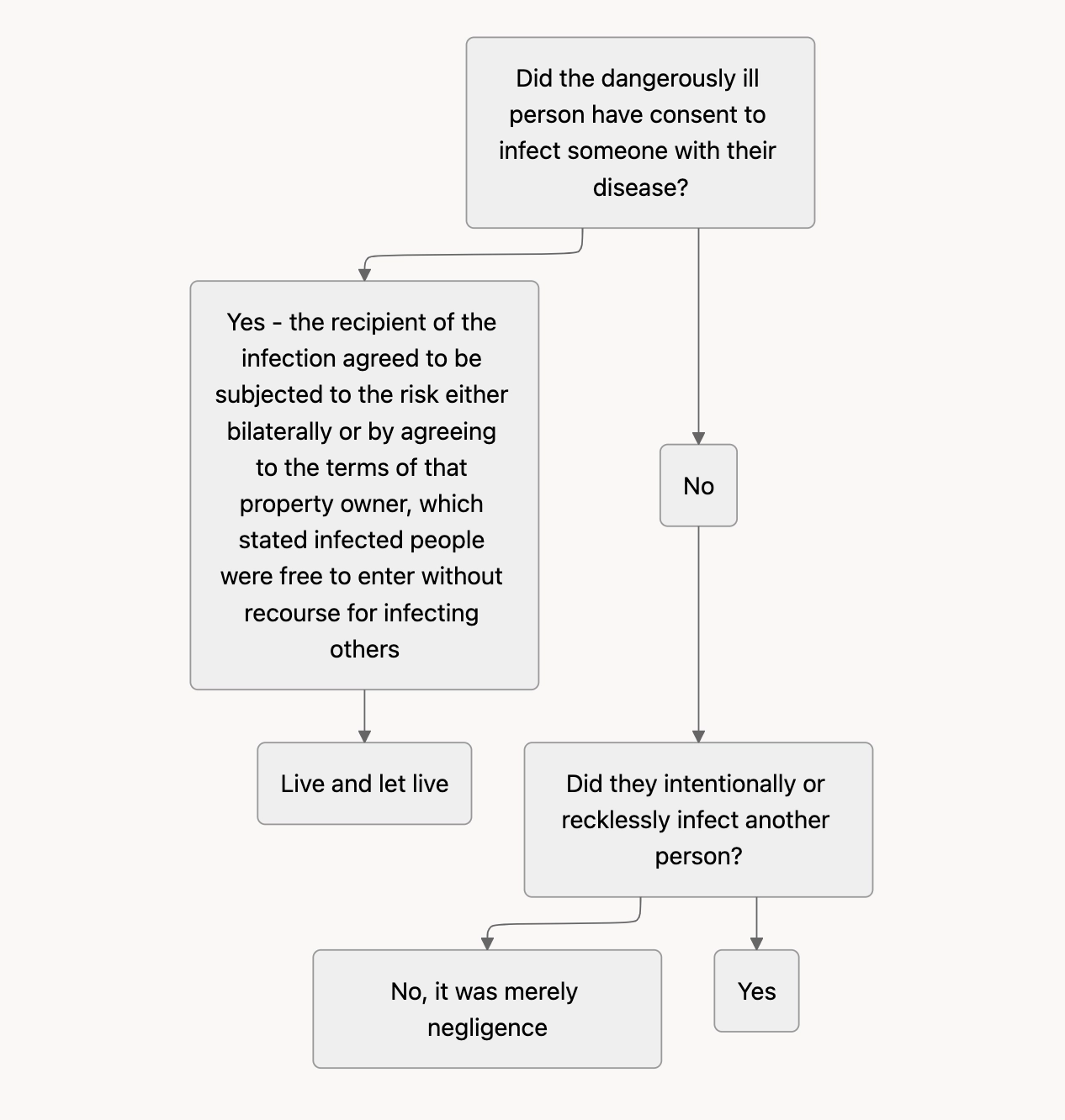Applying the Legal Principle
Infecting others is ‘initiating nonconsensual physical force’ (or creating a substantial risk of doing so)
- A person with a dangerous contagious illness violates the Legal Principle by infecting another person who has not consented to the risk of being infected. It is the responsibility of the infected person to avoid infecting others or even creating a substantial risk to others.
- The substantial risk of involuntarily infecting another person with a dangerous illness extends beyond the boundary of the infected person’s private property.
- For example, we could imagine a deadly virus that an infected person effectively transmits beyond a private-property border with a sneeze, cough, or merely by exhaling.
- The neighbor suffering the trespass, as with any trespass (like pollution), would have an absolute right to immediately terminate the trespass utilizing the least intrusive and most narrowly-tailored means possible.
- The burden of proving such a scenario is always on the person asserting that such a trespass is at least a substantial risk. As always, when assessing risk, we consider both the likelihood of the perceived harm materializing and the magnitude of the harm if it occurs.
- A virus is part of the natural environment and acts independently – no action is required of any person for a virus to replicate in their bodies, so no person violates the Legal Principle when a virus involuntarily replicates in their body, so long as they don’t infect others.
The Legal Principle does not prescribe how breaches should be avoided
- Imposing one-size-fits-all ‘solutions’ for avoiding infection improperly usurps the risk-related decisions of competent adults.
- Examples of such coercive methods that breach the Legal Principle include: forcing businesses closures, mandating vaccines or any other coercive methods.
Private property owners can consent to the risks
- Individuals and private business owners are free to invite others to enter their property under any circumstances they deem appropriate.
- Business owners can opt to close or remain open under any circumstances they choose, and their customers can opt to do business with them or not. Business owners always remain free to require masks, social distancing, proof of testing, vaccinations, or anything else they deem appropriate to enter their private property.
Local communities decide
- What constitutes a ‘dangerous contagious illness’ comes down to facts. Factual disputes by reasonable people can be difficult to resolve.
- Life itself requires our implied consent to the ordinary risks that accompany daily life in the community in which we live. When analyzing whether a risk is “substantial” such that someone violates the Legal Principle, we should exempt ordinary daily life risks.
- What makes a risk “substantial” should always involve considerations about the level of danger involved, the likelihood that the harm will materialize, and how common that risk is in the context of daily life in the relevant community.
Punishment depends on intent
- We properly treat an infected person who intentionally or recklessly infects another differently from one who negligently infects another.
Governments may not discriminate.
- Unlike private property owners, government action is properly subject to special restraining laws and rules.
- Overburdening the healthcare system is a legitimate concern. However, this concern arises directly from the government’s over-regulation and co-opting of the private healthcare system in the first place. Most private for-profit businesses would view a rush of new business as a positive development, at least financially, and expand or react accordingly.
Free markets are best for dealing with pandemics
- In a free healthcare market, we should expect a much more responsive healthcare system that is better able to expand and adapt to changing demands for medical attention.
- Our best defense against pandemics is to foster an environment of freedom, peace, and prosperity where science can continue to progress so we can more effectively detect, contain, and mitigate them.





